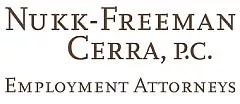- within Employment and HR topic(s)
Following on the heels of the Federal Trade Commission's fouled effort to ban employment-related non-competition agreements nationwide (see our prior eAlerts on the status of the FTC's Final Rule HERE, HERE and HERE), National Labor Relations Board General Counsel Jennifer A. Abruzzo issued a memo to all NLRB field offices on October 7, 2024 (the "Memo"), doubling down on her efforts to tackle employer agreements that restrict employee mobility. GC Abruzzo takes the stance in the Memo that such agreements are unlawful as they (i) chill employees from exercising their rights under Section 7 of the National Labor Relations Act (the "Act") to take collective action to improve their working conditions and (ii) undermine the bargaining power of employees in labor disputes. As more fully discussed below, the GC sets forth her game plan in two parts, first addressing non-competition agreements and then turning to so-called "stay-or-pay" provisions. Finally, as an exercise of her prosecutorial discretion, she closes the Memo by granting employers a 60-day window to cure preexisting stay-or-pay arrangements or face prosecution.
Part I – Employees Entitled to Make-Whole Relief for Non-Competes
In the first few pages of the Memo, GC Abruzzo expands on her May 30, 2023 field memo in which she took the position that most non-competition agreements violate the NLRA (see our eAlert HERE for more information on the May 30 memo). The new Memo puts employers on notice of the General Counsel's intent to seek "make-whole" relief for the impact on employees of unlawful non-compete agreements. The Memo explains that simply rescinding discipline or reversing the financial cost of legal enforcement actions is not enough to remedy the true cost to employees. In addition, according to GC Abruzzo, employees must be compensated for losses they may incur during employment as a result of their fear of breaching the unlawful agreement, such as forgoing opportunities to change jobs or to use outside prospects as leverage to improve their wages and benefits.
Accordingly, GC Abruzzo directed all Regional Directors and Officers and Officers-in-Charge to provide employees before them with the chance to demonstrate that (1) there was a vacancy available for a job with better pay or benefits, (2) they were qualified for that job, and (3) they were discouraged by the non-compete from applying for or accepting that job. If the employee is able to satisfy these three criteria, the employer must be held to compensate them for the difference between what they would have received and what they did receive for the same period. For employees who have separated from the employer, additional make-whole relief may be applicable where the employee meets similar criteria to establish they incurred costs by having to relocate outside of the geographic region covered by the non-compete and/or take a lower-paying job to avoid triggering the terms of the non-compete agreement. The GC has recommended that the National Labor Relations Board (the "Board") amend its standard notice posting to solicit information from employees on their entitlement to these additional remedies.
Part II – Stay-or-Pay Presumptively Unlawful
Part II of the Memo adds stay-or-pay provisions to the NLRB's list of foul plays. "Stay-or-pay" references a range of provisions under which employees must remain employed for a specified period of time or pay their employer, including training repayment agreement provisions, educational repayment contracts, quit fees, damages clauses, sign-on bonuses, relocation stipends, or other types of cash payments tied to a mandatory stay period. GC Abruzzo opines that certain of these provisions, like non-competes, infringe on Section 7 rights unless narrowly tailored because they chill employees from engaging in protected activity out of fear they will be terminated and that would trigger the repayment obligations. The Memo urges the National Labor Relations Board to assess stay-or-pay clauses as presumptively unlawful. Employers may rebut the presumption by proving that the provision is narrowly tailored as it: (1) was voluntarily entered in exchange for a benefit; (2) has a reasonable repayment amount – no more than the cost to the employer – that is stated up front; (3) has a reasonable stay period, to be determined on a case-by-case basis; and (4) does not require repayment where the employee is terminated without cause. Stay-or-pay provisions that are strictly for purposes of coercing employees to remain employed are per se unlawful.
The GC recommends that the Board allow employers to cure existing stay-or-pay arrangements where they were voluntarily entered with informed consent but not otherwise narrowly tailored by modifying the offending provision such as by reducing the stay period or eliminating repayment in the event of termination without cause. In contrast, for non-voluntary stay-or-pay arrangements or where the amount of debt is not specified, the Board should order the employer to rescind the provision and erase any debt. As with non-competes, GC Abruzzo advocates for employees to be provided the opportunity for make-whole relief by establishing that they were discouraged from a better-compensated job for which they were qualified due to the stay-or-pay provision, and for the Board to amend its standard notice posting accordingly.
In the final paragraphs of the Memo, GC Abruzzo pledges to prosecute unlawful stay-or-pay arrangements entered into after October 7, but gives employers until December 6, 2024, to cure preexisting stay-or-pay provisions for which they have a legitimate business interest. For example, employers can reduce excessive repayment amounts, shorten stay periods to a reasonable period, and eliminate repayment requirements in the event of termination without cause in existing provisions to avoid prosecution. If the provision was not entered into voluntarily, no cure is available and the GC will bring a complaint with retroactive application. The Memo is the latest step in the NLRB's recent enforcement efforts with regard to such provisions. For example, in January 2024, the NLRB settled a complaint against a Cincinnati, Ohio-based spa alleging the company's non-compete and training repayment provisions – including, among other things, repayment of up to $75,000 in training costs for employees departing within the first 12 months of employment and prohibiting employees from practicing aesthetic services within a 20-mile radius for two years after termination – violated the Act. Harper Holdings, d/b/a Juvly Aesthetics, NLRB Case No. 09-CA-300239 (filed July 27, 2022). The settlement required the Company to rescind the offending agreements and pay $25,000 in damages to two employees.
The content of this article is intended to provide a general guide to the subject matter. Specialist advice should be sought about your specific circumstances.


